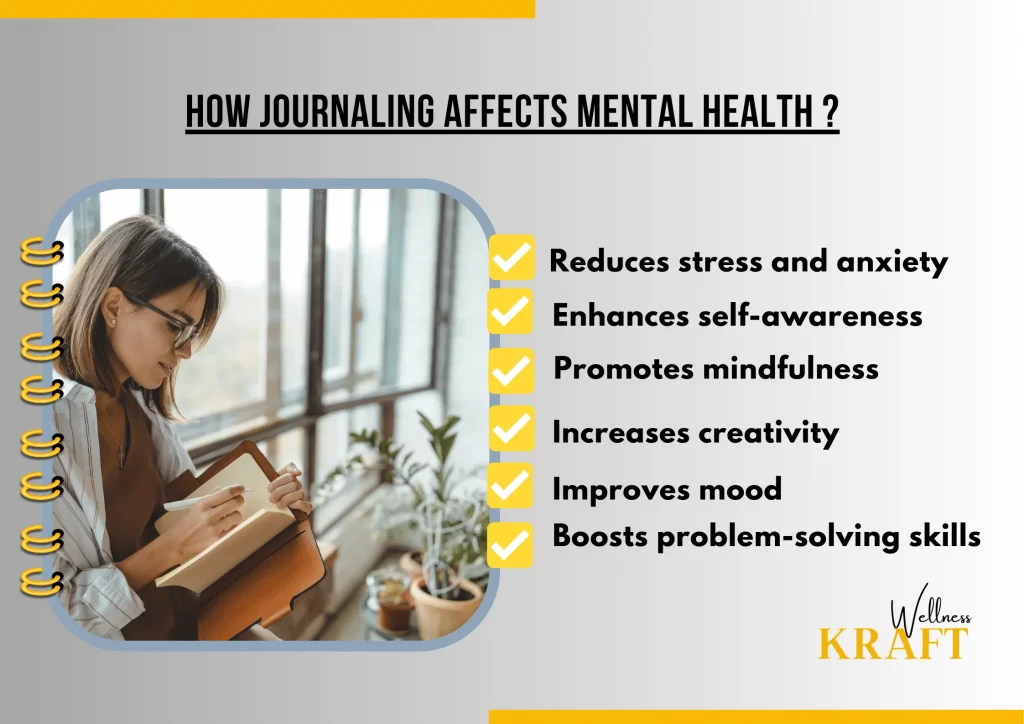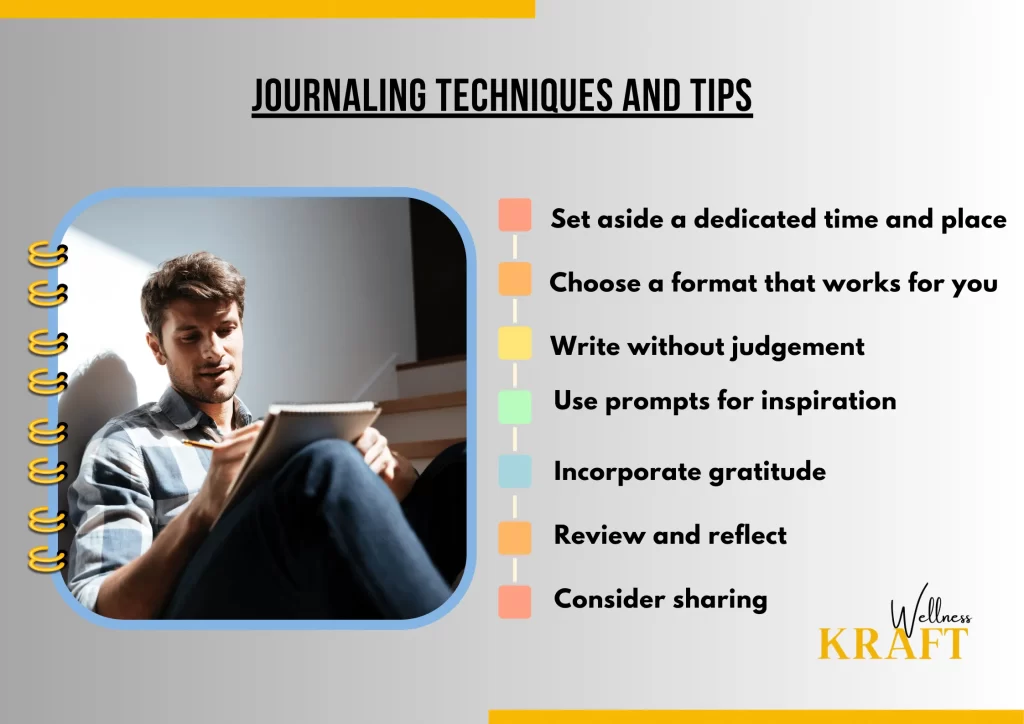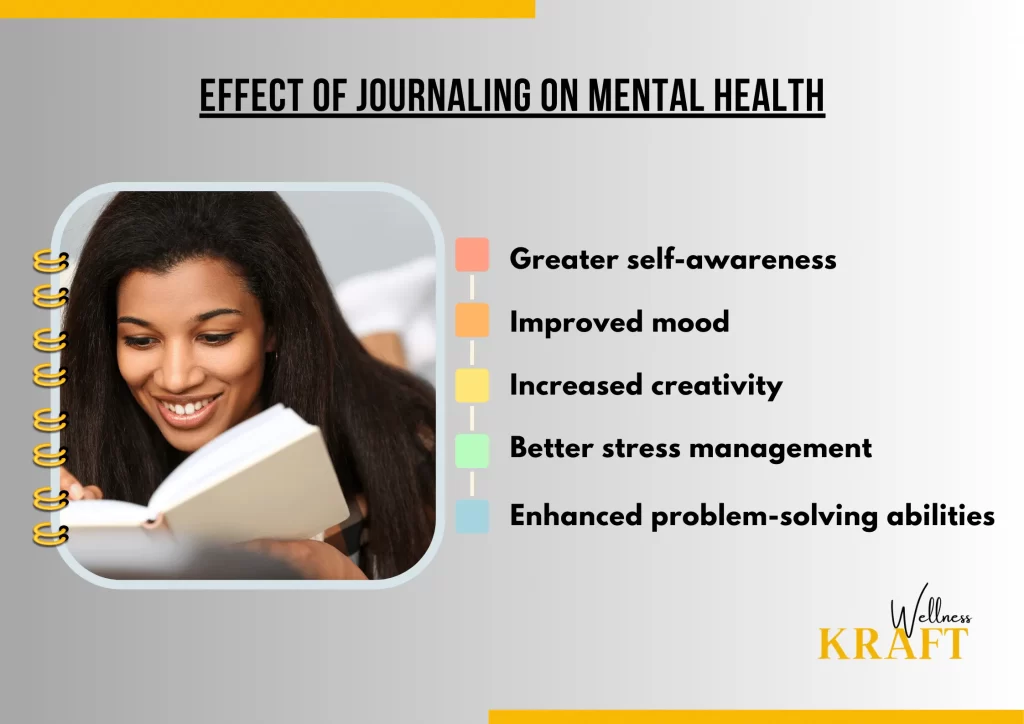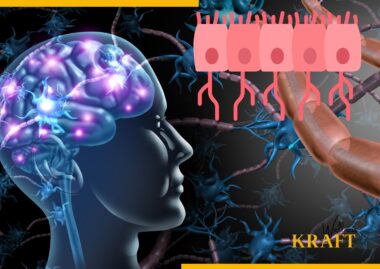“Journaling allows us to see our growth, our patterns, and our habits. It helps us to be more intentional about our lives and to make positive changes.” – Wellness Kraft
Introduction
Mental health is a crucial aspect of overall well-being, and in recent years, there has been an increasing focus on promoting good mental health. While traditional forms of therapy and medication can be effective for some, alternative methods are also gaining popularity.
One such method is journaling, which involves writing down thoughts and feelings in a notebook or digital platform. It has been used for centuries and has been shown to have numerous mental health benefits. In this article, we will explore the history and benefits of journaling for mental health, as well as provide tips and techniques.
Table of Contents
What is Journaling?
Journaling is a process of writing down one’s thoughts, feelings, and experiences in a dedicated notebook or digital platform. The act of journaling can take many forms, from recording daily events to exploring deeper emotions and experiences. It can be done privately or shared with others and can serve a variety of purposes, such as creative expression or problem-solving. Essentially, it is a tool for self-reflection and self-discovery, allowing individuals to gain insight into their thoughts and emotions.
History of Journaling
The practice of journaling has a long and rich history, dating back to ancient civilizations. The earliest recorded use of it was by the Roman Emperor Marcus Aurelius, who kept a personal diary to reflect on his thoughts and experiences. Throughout history, other famous figures such as Leonardo da Vinci, Anne Frank, and Ernest Hemingway have also used journaling as a means of self-expression and reflection.
In the 19th and 20th centuries, it became more accessible to the general public, with the advent of inexpensive paper and printing technologies. Personal journals became a popular means of recording daily events, documenting personal growth, and working through difficult emotions. During this time, psychologists and therapists also began to recognize the therapeutic benefits of journaling, leading to the development of journaling as a clinical tool.
Today, journaling remains a popular tool for self-reflection and personal growth, with many different styles and approaches available to suit individual needs. It is also becoming increasingly popular as a form of self-care and mental health management, with research supporting its positive effects on mental health.
How Journaling Affects Mental Health ?

Journaling has been shown to have numerous mental health benefits, affecting the mind and body in a variety of ways. Here are some of the ways that journaling can positively impact mental health:
Reduces stress and anxiety:
By writing down worries and concerns, individuals can release the tension they feel and gain perspective on their problems.
Enhances self-awareness:
It can help individuals identify and clarify their thoughts and feelings, leading to greater self-understanding.
Promotes mindfulness:
By focusing on the present moment and the act of writing, individuals can enter a meditative state that promotes relaxation and calmness.
Increases creativity:
It can serve as a tool for creative expression, allowing individuals to explore their inner thoughts and emotions.
Improves mood:
Writing down positive experiences and gratitude can improve mood and overall well-being.
Boosts problem-solving skills:
Journaling can help individuals work through complex issues and develop solutions to problems.
Overall, it can be a powerful tool for promoting mental health and well-being, providing a safe and effective outlet for self-expression and self-reflection.
Journaling Techniques and Tips

There are many different techniques and tips to help individuals get started and maintain a consistent practice. Here are some ideas to consider:
Set aside a dedicated time and place:
Schedule a specific time each day or week to journal, and create a comfortable space that is conducive to reflection and introspection.
Choose a format that works for you:
Experiment with different styles of journaling, such as free writing, prompts, or bullet journaling, to find what works best for your needs and preferences.
Write without judgement:
Allow yourself to write freely and openly, without worrying about spelling, grammar, or content. Remember, this is a personal process and there is no right or wrong way to do it.
Use prompts for inspiration:
If you’re feeling stuck, consider using prompts to guide your writing. These can be simple questions or more complex prompts designed to explore specific themes or issues.
Incorporate gratitude:
Writing down things you are thankful for can help boost mood and promote positive thinking. Consider starting or ending each journaling session with a list of things you’re grateful for.
Review and reflect:
Periodically review past entries to gain insight into your growth and progress. Reflect on your writing to identify patterns, areas of growth, and areas that may need further exploration.
Consider sharing:
While journaling is often a private process, consider sharing your writing with trusted friends or a therapist for additional feedback and support.
Examples of Journal Prompts

Journal prompts are a great way to get started with journaling or to help inspire new ideas and insights. Here are some examples of journal prompts to consider:
1.What are three things you’re grateful for today?
2.Write about a challenge you’re currently facing and brainstorm possible solutions.
3.Describe a favorite childhood memory and reflect on why it was meaningful to you.
4.What are some self-care practices that you can incorporate into your daily routine?
5.Write a letter to your younger self, offering advice and encouragement.
6.Reflect on a difficult experience and identify what you learned from it.
7.Write about a place that brings you peace and describe what it looks, feels, and smells like.
8.What are some things that make you feel anxious or stressed? How can you manage these feelings?
9.Describe your ideal day, from morning to night.
10.Reflect on a time when you showed kindness to someone else. How did it make you feel?
Other Forms of Expressive Writing

While journaling is a popular form of expressive writing, there are many other ways that individuals can use writing to explore their thoughts and emotions. Here are a few examples:
Poetry:
Writing poetry can be a powerful form of self-expression, allowing individuals to explore complex emotions and experiences through the use of language and imagery.
Fiction:
Writing fiction can offer a creative outlet for exploring themes and ideas related to one’s personal experiences and perspectives.
Memoir:
Memoir writing allows individuals to reflect on their life experiences and share them with others, providing an opportunity for personal growth and connection.
Letters:
Writing letters to others (whether they are sent or not) can be a way to express emotions and work through issues in a structured and deliberate way.
Blogging:
Starting a blog can be a way to share personal experiences and perspectives with a wider audience, providing a platform for reflection and discussion.
These are just a few examples of the many ways that writing can be used as a tool for self-expression and self-reflection. The key is to find a form of writing that resonates with you and allows you to explore your thoughts and emotions in a meaningful way.
Combining Journaling with Other Mental Health Practices

Journaling can be a powerful tool for promoting mental health and well-being, and it can be even more effective when combined with other mental health practices. Here are a few examples of how to combine with other practices:
Meditation:
Pairing journaling with a regular meditation practice can help individuals to cultivate mindfulness and promote greater self-awareness. Consider it before or after a meditation session to reflect on your thoughts and feelings.
Therapy:
Journaling can be an effective supplement to therapy, allowing individuals to explore their thoughts and emotions in a more structured and deliberate way. Consider sharing your journal entries with your therapist to gain additional insight and support.
Exercise:
Combining journaling with regular exercise can help to manage stress and improve mood. Consider keeping a journal to track your progress and reflect on the benefits of exercise.
Gratitude practice:
Incorporating a gratitude practice into your journaling routine can help to promote positive thinking and boost mood. Consider starting or ending each session with a list of things you’re grateful for.
Creative expression:
Pairing it with other creative outlets, such as art, music, or dance, can help individuals to explore their emotions in a more holistic and expressive way. Consider incorporating different forms of creative expression into your practice.
By combining with other mental health practices, individuals can create a more comprehensive approach to self-care and well-being. The key is to experiment with different techniques and find what works best for your unique needs and preferences.
Effect of Journaling on Mental Health

The effects on mental health can vary from person to person, and may depend on a number of factors, including the individual’s mental health history, the specific journaling technique used, and the frequency and duration of the journaling practice. However, some common after-effects may include:
Greater self-awareness:
By reflecting on thoughts and emotions in a structured way, journaling can help individuals to develop greater self-awareness and understanding of their own mental and emotional patterns.
Improved mood:
Journaling may help to reduce symptoms of depression and anxiety, and promote feelings of calm and well-being.
Better stress management:
By providing a way to process and manage difficult emotions, it can help individuals to cope with stress more effectively.
Increased creativity:
Journaling can promote creative thinking and self-expression, which may contribute to a greater sense of fulfillment and well-being.
Enhanced problem-solving abilities:
By encouraging reflection and analysis, it can help individuals to approach problems and challenges in a more constructive and effective way.
It’s worth noting that these effects may take time to develop, and may require consistent and sustained practice over a period of weeks or months. Additionally, it may not be a substitute for professional mental health care, and individuals who are experiencing serious or persistent mental health issues should seek the guidance of a qualified mental health professional.
Research Analysis
One study published in the Journal of Clinical Psychology found that expressive writing, including journaling, was associated with improved mood and decreased symptoms of anxiety and depression. The study participants wrote for 20 minutes a day for four consecutive days, and the benefits were observed up to six months later.
Another study published in the Journal of Health Psychology found that journaling was associated with improved immune system functioning in patients with HIV. The participants wrote about their thoughts and feelings regarding their HIV status, and the researchers observed improvements in CD4 T-cell counts, a marker of immune system function.
A study published in the Journal of Traumatic Stress found that journaling was associated with decreased symptoms of post-traumatic stress disorder (PTSD) in survivors of intimate partner violence. The participants wrote about their experiences for 20 minutes a day, and the researchers observed improvements in PTSD symptoms.
These are just a few examples of the authentic research studies that have been conducted on journaling and mental health.
Overall, research suggests that it can be a valuable tool for promoting mental and physical health, and may be particularly beneficial for managing stress, improving mood, and enhancing self-awareness.
Concluding Thoughts
In conclusion, journaling is a powerful tool for promoting mental and emotional well-being. By providing a structured and reflective way to process thoughts and emotions, it can help individuals to develop greater self-awareness, manage stress and difficult emotions, and promote overall mental and emotional health.
As highlighted in the Wellness Kraft article, there are a variety of techniques and prompts that can be used to make journaling more effective and enjoyable, and to help individuals achieve their specific mental health goals. Additionally, combining with other mental health practices, such as mindfulness or therapy, may enhance the benefits of the practice.
While there is still much to learn about the specific mechanisms by which journaling promotes mental health, the research conducted thus far provides compelling evidence for its effectiveness. As such, incorporating into a daily or weekly self-care routine may be a valuable step toward promoting greater mental and emotional well-being.
Key Takeaways
1.Journaling is a practice that involves writing down thoughts and emotions in a structured way.
2.The practice has a long history and has been associated with a range of mental and emotional health benefits.
3. It can improve mood, promote self-awareness, enhance problem-solving abilities, and improve stress management.
4.There are a variety of techniques and prompts that can be used to make the practice more effective and enjoyable.
5. It can be combined with other mental health practices, such as therapy or mindfulness, to enhance its benefits.
6.Research suggests that journaling is an effective tool for promoting mental and emotional well-being.
7.Consistent and sustained practice over a period of weeks or months may be required to see the full benefits of journaling.
8. It should not be seen as a substitute for professional mental health care, and individuals with serious or persistent mental health issues should seek the guidance of a qualified mental health professional.
FAQs
1.What is journaling?
It is a practice that involves writing down thoughts and feelings in a structured way, often with the intention of processing emotions, gaining insight, and promoting mental and emotional well-being.
2.What are the benefits of journaling for mental health?
It has been associated with a range of mental and emotional health benefits, including improved mood, increased self-awareness, enhanced problem-solving abilities, and improved stress management.
3.How do I get started with journaling?
To get started, you can choose a specific time of day to write, select a comfortable and private space to write, and start with a simple prompt or free-write exercise.
4.What should I write about in my journal?
You can write about anything that is on your mind or that you feel is important to process, such as daily events, emotions, stressors, or personal goals.
5.How often should I journal?
The frequency can vary depending on personal preference and lifestyle. Some people find it helpful to write daily, while others prefer to write less frequently.
6.What are some journaling techniques and prompts?
There are a variety of techniques and prompts that can be used to make journaling more effective and enjoyable, such as gratitude journaling, goal-setting journaling, and reflective writing.
7.Can journaling be combined with other mental health practices?
Yes, it can be combined with other mental health practices, such as mindfulness or therapy, to enhance its benefits.
8.How long does it take to see the benefits of journaling?
The benefits may become apparent over time, with consistent and sustained practice over a period of weeks or months.
9.Is journaling a substitute for professional mental health care?
No, it should not be seen as a substitute for professional mental health care. Individuals with serious or persistent mental health issues should seek the guidance of a qualified mental health professional.
10.Can journaling be harmful?
In general, it is a safe and beneficial practice. However, in rare cases, journaling about traumatic experiences may trigger intense emotions or distress. If you experience intense emotions or distress during journaling, it may be helpful to take a break or seek professional support.










